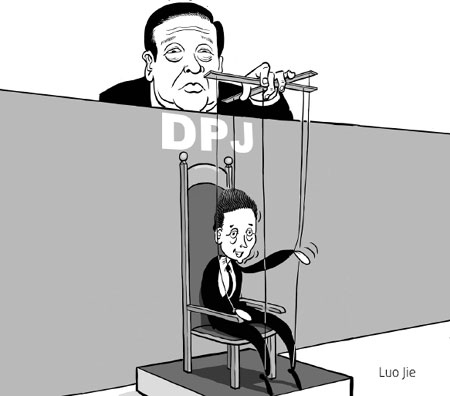Ozawa exits, only to pull strings from behind
The "shadow shogun" of Japanese politics has finally resigned as president of the Democratic Party of Japan (DPJ), the country's largest opposition party. Ichiro Ozawa stepped down on May 11, after his aide was arrested for allegedly accepting illegal donation.
Though he had been under pressure to resign ever since the state-paid aide was arrested in March, he chose an opportune moment to do so. Had he not resigned on May 11, he would have had to face embarrassing questions at the May 13 meeting of presidents of parties in office and in the opposition.
The resignation is both a boon and curse for the DPJ. On the one hand, it rids the party of a tainted figure and minimizes the chances of it being drubbed in the upcoming election to the Lower House of parliament. On the other, despite stepping down, Ozawa is likely to continue playing an important role in the DPJ, and thus could undermine the party's chances of seizing power, which looked so likely just a few months ago, especially because of Prime Minister Taro Aso's poor public rating.
On May 16, the DPJ named Yukio Hatoyama its new leader. Immediately after assuming office, Hatoyama chose his team: Katsuya Okada was made secretary-general, and Ozawa, acting president in charge of the election. So it seems Hatoyama will continue with Ozawa's political line.
As a veteran and ambitious politician, Ozawa has lots of controversial views on political and security issues. He wants to fundamentally change the landscape of Japanese politics by breaking the Liberal Democratic Party's (LDP) monopoly on power.
His idea, however, has encountered many difficulties in reality. In order to seize power, he formed a coalition with the LDP when Keizo Obuchi was the prime minister. In 2007, he sought to negotiate a "new institution" with Yasuo Fukuda, then prime minister, but did not succeed because of opposition of his own party.
On security, Ozawa is against Japan's over-reliance on the US, supports setting up an "isosceles triangle" among Tokyo, Beijing and Washington, and asserts Japan should march toward a "normal state". He says the ongoing war in Iraq is different from the 1991 Gulf War because it is unilateral in nature. Thus by helping fight the war in Iraq, Japan is exerting the right of collective defense instead of being part of a UN peacekeeping force.
Security policies have usually been the cause of disputes within the DPJ. The consensus the party reached on security was: the Self-Defense Force should conform to the principle of "purely defensive defense" prescribed by Article 9 of Japan's Constitution, the UN should play the central role in international affairs, a reserve army of the UN should be founded, and Japan could take part with UN forces under the world body's charter.

Guided by this idea of security, the DPJ is firmly against the extension of the Anti-Terror Special Measures Law, and does not support the Japanese government's decision to refuel US battleships in the Indian Ocean.
Hatoyama believes there is nothing wrong with Ozawa's policies, and he will follow his predecessor's line both in domestic and foreign matters. As he has conceded, some of Ozawa's viewpoints have been written into the "policy convention" for the general election.
Hatoyama agrees with Ozawa's idea that "politics is life". He vows to "sweep Japanese politics" clean of its bureaucratic ills. He says that the consumption tax rate should not be raised amid the global economic crisis, and claims that at least 10 percent of the government's budget is wasted, and if voted to power, the DPJ would use it to improve people's life and livelihood.
Though he has been dubbed a "stooge" of Ozawa, he says he will improve on his predecessor's achievements, and describes his new approach as "inheritance, development and Hatoyama characteristics".
"Hatoyama characteristics" as described by him are "loving heart politics", "friendship economy" and "friendship diplomacy". He believes "friendship" should act as a bridge between "freedom" and "democracy", and brands himself a nationalist with a "loving heart". He advocates recovering the Northern Territories, and has been consistent with the DPJ's stance on US military bases in Japan.
Since July 2007, when the LDP failed to get a majority in the election to the Upper House, Japan has seen a ruling coalition shackled by problems. The opposition parties, headed by the DPJ, have used their majority in the House of Councilors to pressure the ruling coalition. That's why the ruling LDP and New Komeito Party have no choice but to rely on their two-thirds majority in the House of Representatives to get important bills passed and prevent their government from falling.
This has made people say: "LDP has the authority, but the DPJ controls the politics." The DPJ has to either seize power in the upcoming general election, or the ruling and the opposition parties have to form a grand coalition.
Though it is still uncertain whether the DPJ will emerge victorious, the election will be a trial of Ozawa's political ideas because he is still the "brain" behind the DPJ's poll strategy.
It's here that Hatoyama could tilt the voters toward the DPJ because people consider him a better prime ministerial candidate than any of the LDP nominees.
The author is a researcher with Institute of Japanese Studies, Chinese Academy of Social Sciences.
(China Daily 05/22/2009 page9)












